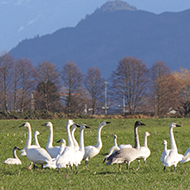Climate change may have stronger effect on smaller-brained birds

Pictured: A flock of Trumpeter swans (C) Shutterstock
New research from Washington University in St Louis has discovered that many North American migratory birds are shrinking in size as temperatures have warmed over the past 40 years.
Despite these findings, it has been discovered that North American migratory birds with significantly large brains, relative to the size of their body, did not shrink as much as smaller-brained birds.
This study, published in Ecology Letters, is the first of its kind to identify a direct link between cognition and animal response to human-made climate change.
Justin Baldwin, PhD candidate in the laboratory of Carlos Botero, explained: “As temperatures warm, body sizes are decreasing.
“But larger-brained species are declining less strongly than small-brained species.”
Analysing information on 70,000 birds that died when colliding with buildings in Chicago from 1978 to 2016, published by the University of Michigan, Baldwin and his colleagues discovered that birds with very large brains had body size reductions that were only one-third the amount observed in birds with smaller brains.
“Relative brain size correlates with increased learning ability, increased memory, longer lifespans and more stable population dynamics [in birds],” Baldwin commented.
“In this case, a bigger-brained species of bird might be able to reduce its exposure to warming temperatures by seeking out microhabitats with cooler temperatures, for example.”
Carlos Botero, assistant professor of biology in Arts and Sciences at Washington University, explained: “One of the first things that jumps out to me from these findings is that we can already see that climate change is having a disproportionate effect on species that have less capacity to deal with environmental change through their behavior.
“This doesn’t mean that climate change is not affecting brainy birds, or that brainy birds are going to do just fine. What our findings suggest is that climate change can have a much stronger effect on the less-brainy birds.”



 The latest
The latest